|








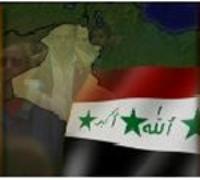


The decrease in violence over the last month has been attributed to a deal we made with tribal leaders who command
their own Army like the we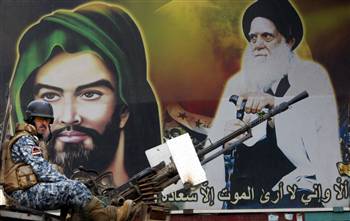 ll known Al-Sadar… The so-called
awakening movements have spread to other areas and have been hailed by the U.S. military…But the military
has acknowledged concerns that some members could retain allegiances to al-Qaida, particularly if they were former insurgents
themselves... ll known Al-Sadar… The so-called
awakening movements have spread to other areas and have been hailed by the U.S. military…But the military
has acknowledged concerns that some members could retain allegiances to al-Qaida, particularly if they were former insurgents
themselves...

Iraq's 'Awakening' pacts prove complicated
Agreements
with U.S. deliver everything 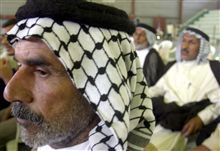 from militia paychecks to seeds from militia paychecks to seeds
HAWR RAJAB, Iraq - They
know him as the sheik. But what that really means in this Sunni town is a bit of everything: community leader, public works
supervisor, agricultural planner, militia captain.
It also helps explain why Maher al-Moaeini and his 500 men threw their lot with the U.S.-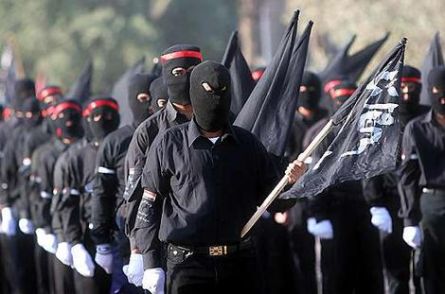 led fight against al-Qaida in Iraq. The
American military could deliver the goods -- from steady paychecks for the militiamen to seeds for farmers. led fight against al-Qaida in Iraq. The
American military could deliver the goods -- from steady paychecks for the militiamen to seeds for farmers.
Mutual bargains such as these _ U.S. aid and respect to
Sunnis in exchange for their fighting power _ drive the so-called Awakening Council movement that has marked one of the most
significant shifts in the power balance in Iraq
since the 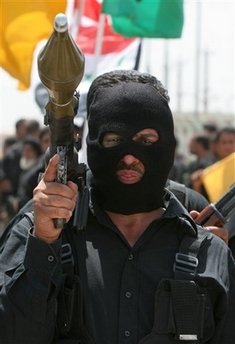 insurgency took root in 2004. insurgency took root in 2004.
Sunnis across Iraq -- more
than 70,000 at last count -- are turning to the Pentagon as generous patrons and allies. Yet it could all sour quickly if
the U.S. assistance to Sunnis dries up or the Shiite-led government resists
Washington's pressure to reward the Sunni militiamen with
jobs in the security forces.
The first Sunni clans made cautious overtures to U.S.
commanders last year in the western Anbar province, then the main insurgent staging grounds. As more Sunni tribes joined the
uprising, al-Qaida and its supporters found their footholds shrinking. And a delighted U.S. military kept sweetening the pot for more Sunni allies who felt ignored by
the Shiite-led government.

Bomber kills 12 at funeral in northern Iraq
Attack latest in spate of deadly bombings in provinces, U.S. says
BAGHDAD
- A suicide bomber blew himself up 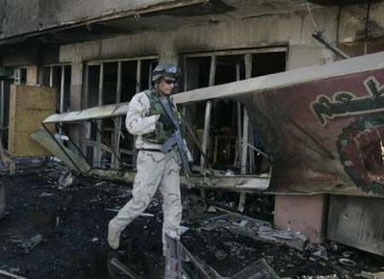 inside a funeral tent Monday in a predominantly Sunni village north of Baghdad, killing at least 12 people and wounding 17. inside a funeral tent Monday in a predominantly Sunni village north of Baghdad, killing at least 12 people and wounding 17.
It
was the third such bombing in Sunni areas in as many days. Nobody claimed responsibility, but it bore the hallmarks of al-Qaida
in Iraq, which has been trying to derail a movement that has seen Sunnis
join forces with the U.S. against the
terror network
Police
rounded up clansmen in Anbar province 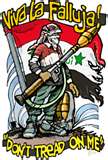 Monday as a U.S.-backed tribal leader suggested a teenager who carried out a suicide bombing near Fallujah the day before
against the anti-al-Qaida fighters had help from inside the group. Monday as a U.S.-backed tribal leader suggested a teenager who carried out a suicide bombing near Fallujah the day before
against the anti-al-Qaida fighters had help from inside the group.
Sunday's
attack killed six people in the former insurgent stronghold and raised concerns about the infiltration of Sunni groups that
have joined forces with the Americans against al-Qaida in Iraq.

General:
Iraqi forces improving, but not ready
U.S.
commander says troops are a lo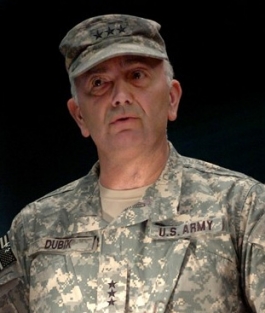 ng way from becoming self-sufficient ng way from becoming self-sufficient
WASHINGTON - A senior military commander told a House
panel on Thursday that Iraq’s security
forces are on track to add another 80,000 personnel by the end of the year, putting them well within reach of their goal of
more than 600,000. He said the forces are still a long way from becoming self-sufficient.
Lt. Gen. James Dubik, head of the Multi-National Security Transition Command, said the Iraqi defense minister
has stressed to him that the country probably won’t assume responsibility for internal security until as late as 2012.
Also, it would be unable to defend its borders until at least 2018.
Th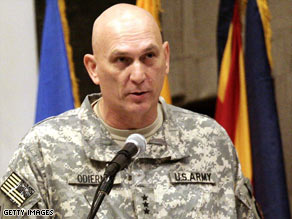 ere are “positive signs, indeed, and steps forward, but the truth is that they simply cannot fix, supply, arm or fuel
themselves completely enough at this point,” ere are “positive signs, indeed, and steps forward, but the truth is that they simply cannot fix, supply, arm or fuel
themselves completely enough at this point,”
Army Lt. Gen. Ray Odierno, the No. 2 commander in Iraq,
said, “In terms of them being able to fight, they’ve really increased their capacity to do that.”
Rep. Ike Skelton, said he is worried that while Iraqi forces get up to speed, U.S. troops will
become worn out.“Security in Iraq
has  improved over the past year, due to the heroic efforts of our troops. ... But the question now is how do we sustain it?” improved over the past year, due to the heroic efforts of our troops. ... But the question now is how do we sustain it?”
At the Pentagon, Defense Secretary Robert Gates said Thursday that “all available evidence” shows
U.S. plans to withdraw five combat brigades through next summer remain on track — which would bring the overall troop
level to about 130,000

ANALYSIS: Discontent surges in Iraq
By HAMZA HENDAWI
BAGHDAD - In the depths of a strangely cold winter in the Middle
East, Iraqis complain that 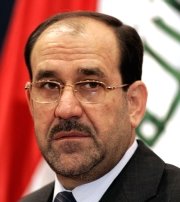 the lights are not on, the kerosene heaters are without fuel and the water doesn't flow _ and they blame the government. the lights are not on, the kerosene heaters are without fuel and the water doesn't flow _ and they blame the government.
And with the war nearing its fifth anniversary, Prime Minister Nouri al-Maliki is feeling the discontent as
well from the most powerful political centers in the majority Shiite community.

"My children are so happy when the power comes back on they dance," said Marwan Ouni…
the nonstop power cuts have made my life tedious. It's depressing."
"Where's the kerosene and the water?" asked 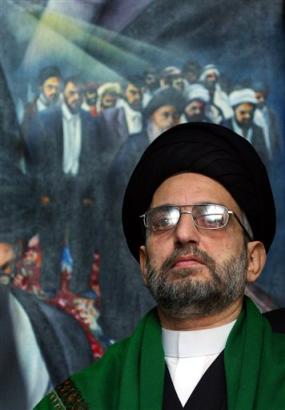 Amjad Kazim, a 56-year-old Shiite who lives in eastern Baghdad.
"We hear a lot of promises but we see nothing." Amjad Kazim, a 56-year-old Shiite who lives in eastern Baghdad.
"We hear a lot of promises but we see nothing."
Stinging criticism late last week from Abdul-Aziz al-Hakim, leader of parliament's largest Shiite bloc,
was a stark break with the past. And a threat by Muqtada al-Sadr, the maverick Shiite cleric who once supported al-Maliki,
not to renew an expiring six-month cease-fire he imposed on his feared militia could upend recent security progress.

U.S.:
Armor-piercing bombings in Iraq decline
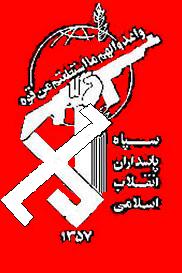
Fewer
Iran-made bombs in recent days, but training still suspected
BAGHDAD
- The U.S. military said Sunday that attacks in Iraq
with Iranian-made bombs have fallen off in recent days after a sharp but brief increase earlier in the month, and that the
overall flow of 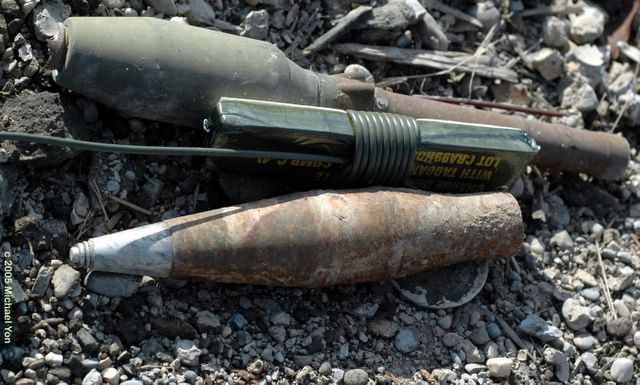 weaponry from Iran has dropped weaponry from Iran has dropped
The Iranian armor-piercing bombs are a threat on a very
different front for the Americans. The bombs, known as explosively formed penetrators, or EFPs, have killed hundreds of American
soldiers.

Violence increases and tensions rise among Iraqi Shiites
BAGHDAD
— A police raid Saturday on an extremist Shiite Muslim mosque t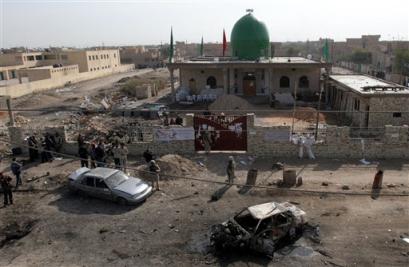 hought to be the headquarters of an extremist cult capped a weekend of violence in southern Iraq, while elsewhere tensions
between Iraq's Shiite-led government and renegade Shiite cleric Moqtada al Sadr continued
to escalate. hought to be the headquarters of an extremist cult capped a weekend of violence in southern Iraq, while elsewhere tensions
between Iraq's Shiite-led government and renegade Shiite cleric Moqtada al Sadr continued
to escalate.
Iraq's national security
advisor said he was briefly taken hostage Saturday in a Baghdad
mosque and implied that his captors were 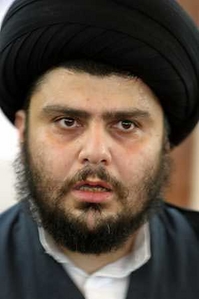 Sadr supporters. Mowaffak al Rubaie was released only after Iraq's interior minister, who oversees the police, intervened. Sadr supporters. Mowaffak al Rubaie was released only after Iraq's interior minister, who oversees the police, intervened.
On Friday, a spokesman for Sadr warned that the cleric might not extend a six-month cease-fire by his Mahdi
Army militia, which U.S. officials say has contributed to the reduction
in violence in Iraq. "This will force
us to reconsider the decision to extend the cease-fire despite repeated public statements in the past that we will."

Despite dropping violence, Gates calls for extended U.S. presence in Iraq
WASHINGTON — Against the backdrop of 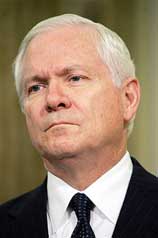 the improved security situation in Iraq, Secretary of Defense Robert Gates announced Thursday a shift in U.S. strategy that
will require an extended U.S. presence in Iraq, although with fewer troops. the improved security situation in Iraq, Secretary of Defense Robert Gates announced Thursday a shift in U.S. strategy that
will require an extended U.S. presence in Iraq, although with fewer troops.
Gates and top uniformed officers sketched out a plan that runs counter to pledges by Democratic presidential contenders
to bring about a rapid drawdown of the U.S. military presence in Iraq.
One candidate, former Sen. John Edwards of North Carolina, called for the withdrawal of nearly
all U.S. combat troops from Iraq
by the end of 2009.
Gates
and the uniformed military leadership said a smaller U.S.
presence will be needed for the foreseeable future to provide support for Iraqi fo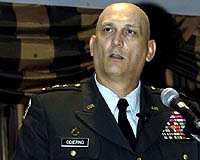 rces. They didn't go as far as Sen. John McCain, R-Ariz., however, who says that U.S.
troops may be stationed in Iraq for decades
or even a century. rces. They didn't go as far as Sen. John McCain, R-Ariz., however, who says that U.S.
troops may be stationed in Iraq for decades
or even a century.
"We'll have some people here, if the
government of Iraq wants it, for some
period of time. That could be five to 10 years. But it will not be at the levels we're at now. I don't believe that that will
be necessary," said Lt. Gen. Raymond Odierno, the No. 2 commander in Iraq,
during a teleconference from Baghdad.



Pakistan military retreats from Musharraf's influence
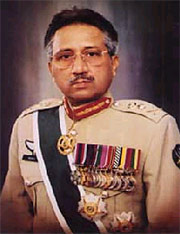
ISLAMABAD, Pakistan — As President Pervez Musharraf grows more unpopular in Pakistan, his
newly named successor as army chief is seeking to distance the institution from the Musharraf regime and pull back its virtual
occupation of the top senior ranks of civilian ministries and state corporations.
Gen. Ashfaq Parvez
Kayani, who was named to the top military job in late November, took two steps t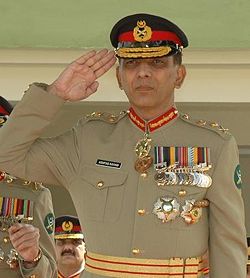 his week. First, he barred all senior military officers from meeting directly with Musharraf without prior approval and prohibited
officers from having any direct involvement in politics. Second, he recalled many army officers from civilian job assignments. his week. First, he barred all senior military officers from meeting directly with Musharraf without prior approval and prohibited
officers from having any direct involvement in politics. Second, he recalled many army officers from civilian job assignments.
It
also could be the Pakistan military's best chance to defeat an increasingly aggressive Islamist insurgency and check rising
political violence in a nation that's fast becoming the central front in the Bush administration'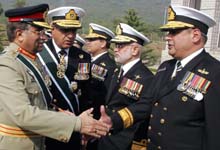 s battle with Islamic radicalism. s battle with Islamic radicalism.
While senior officers in Pakistan have for
decades expected such posts as a reward for their military service upon retirement, Musharraf's embedding of hundreds of active-duty
officers in prominent civilian posts sparked cries that the country's bureaucracy was being militarized.



Sectarian suicide blast kills 9 at Pakistani mosque
ISLAMAB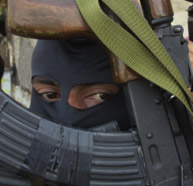 AD, Pakistan — The violence that's engulfing Pakistan lurched in a sectarian direction Thursday as an
apparent suicide bomber targeted a gathering of Shiite Muslims in the northwestern city of Peshawar, leaving nine people dead
and 25 injured. AD, Pakistan — The violence that's engulfing Pakistan lurched in a sectarian direction Thursday as an
apparent suicide bomber targeted a gathering of Shiite Muslims in the northwestern city of Peshawar, leaving nine people dead
and 25 injured.
Witnesses said the assailant
— who appeared to be a teenager — entered a prayer hall, opened fire with a gun, then blew himself up.
The assailant somehow circumvented strict security measures
that the government had put in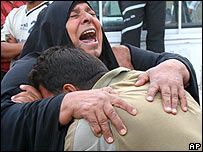 place for the mourning period, with worshipers frisked and sent through metal detectors before being allowed to enter Shiite
prayer halls. place for the mourning period, with worshipers frisked and sent through metal detectors before being allowed to enter Shiite
prayer halls.
It was the third major bombing since the assassination Dec. 27
of former Prime Minister Benazir Bhutto. Blasts in Lahore and Karachi have claimed
dozens of victims.

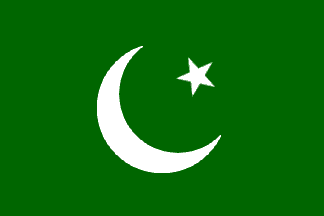

Islamic militants capture Pakistani fort
By Saeed Shah | McClatchy Newspaper
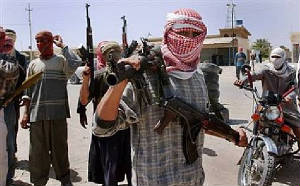 ISLAMABAD, Pakistan — Hundreds of Islamic militants overran and occupied a fort near Pakistan's border with Afghanistan
in a bold assault that left as many as 47 people dead. ISLAMABAD, Pakistan — Hundreds of Islamic militants overran and occupied a fort near Pakistan's border with Afghanistan
in a bold assault that left as many as 47 people dead.
The loss
of the Sararogha Fort was a significant blow to Pakistani President Pe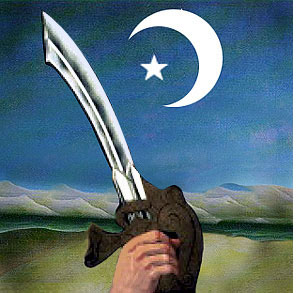 rvez Musharraf's efforts to re-establish control over the frontier region of South Waziristan, which has become a base for Taliban and al Qaida operations. rvez Musharraf's efforts to re-establish control over the frontier region of South Waziristan, which has become a base for Taliban and al Qaida operations.
Pakistan's northwestern border with Afghanistan, where Osama bin Laden and his top lieutenants
fled after a U.S. assault drove them out of Afghanistan in 2001, is fast overtaking Iraq as the central front in the B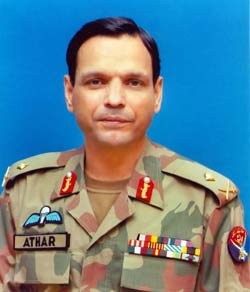 ush administration's war on terrorism. U.S. officials are increasingly worried that if militants seize control of the region,
they could establish an even more secure terrorist base than the one they already have and further destabilize Pakistan's shaky central government. ush administration's war on terrorism. U.S. officials are increasingly worried that if militants seize control of the region,
they could establish an even more secure terrorist base than the one they already have and further destabilize Pakistan's shaky central government.
"This was
a very intense attack, and the number of the militants this time was quite large," said Maj. Gen. Athar Abbas.



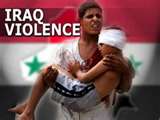

Round-up of Daily Violence in Iraq
By
Laith Hammoudi | McClatchy Newspapers
The daily Iraqi violence
report is compiled 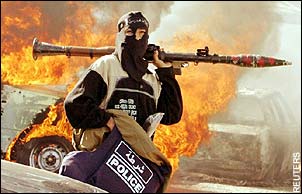 by McClatchy Newspapers Special Correspondents in Baghdad from police, military and medical reports. This
is not a comprehensive list of all violence in Iraq,
much of which goes unreported. It’s posted without editing as transmitted to McClatchy’s Washington Bureau. by McClatchy Newspapers Special Correspondents in Baghdad from police, military and medical reports. This
is not a comprehensive list of all violence in Iraq,
much of which goes unreported. It’s posted without editing as transmitted to McClatchy’s Washington Bureau.
BAGHDAD
An IED exploded targeting a US convoy near al Nosoor square west
Baghdad around 8,00  am. No casualties reported. am. No casualties reported.
Around 8,15 am, two mortar shells hit Owereeg industrial
area south Baghdad causing no casualties.
Three civilians
were injured in an IED explosion that exploded after the passing of an American convoy in Baladiyat neighborhood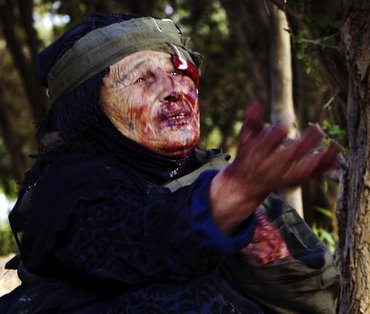 east Baghdad around 10,00 am. Some cars were damaged in the
explosions while no casualties among the American patrol were reported. east Baghdad around 10,00 am. Some cars were damaged in the
explosions while no casualties among the American patrol were reported.
Two road side bombs (2 bottles
filled with explosive materials) exploded near al Qubbanchi mosque in Harthyah neighborhood south Baghdad around 1,00 pm. No casualties reported.
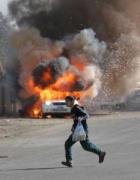 Police found seven anonymous bodies in Baghdad today. Four
bodies were found in Rusafa, the eastern side of Baghdad in the following neighborhoods (1
body in Zayuna, 1 body in New Baghdad, 1 body in Ma’amil
and 1 body in Talbiyah). The three other bodies were found in Karkh, the western side of Baghdad
in the following neighborhoods (2 bodies in Tobchi and 1 body in Doura). Police found seven anonymous bodies in Baghdad today. Four
bodies were found in Rusafa, the eastern side of Baghdad in the following neighborhoods (1
body in Zayuna, 1 body in New Baghdad, 1 body in Ma’amil
and 1 body in Talbiyah). The three other bodies were found in Karkh, the western side of Baghdad
in the following neighborhoods (2 bodies in Tobchi and 1 body in Doura).
Police said that all the bodies were handcuffed,
eye folded and shot dead.Two
civilians were killed and nine others were 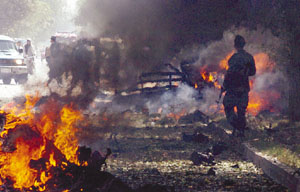 wounded in a parked car bomb downtown Gayara town south of Mosul
city today morning wounded in a parked car bomb downtown Gayara town south of Mosul
city today morning
Sulaimaniyah
Gunmen killed attacked a house in Kalar village
140 kms south of Sulaimaniyah province yesterday night killing a 35 years old mother and her 13 years old daughter.
Salahuddi
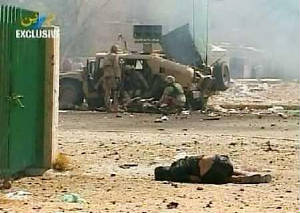 15 civilians were killed and 8 others were wounded when a suicide bomber detonated himself inside a mourning tent in al Hajjaj
village south Tikrit around 7,00 pm. The suicide bomber tried to assassinate the security deputy of Salahuddin province Ahmed
Abdullah who was in the mourning tent of his dead uncle. Abdullah survived from the assassination attempt. 15 civilians were killed and 8 others were wounded when a suicide bomber detonated himself inside a mourning tent in al Hajjaj
village south Tikrit around 7,00 pm. The suicide bomber tried to assassinate the security deputy of Salahuddin province Ahmed
Abdullah who was in the mourning tent of his dead uncle. Abdullah survived from the assassination attempt.Diyala
Two policemen were wounded in an I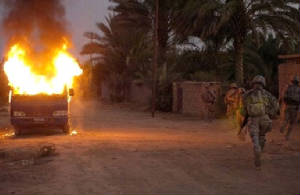 ED explosion that targeted their patrol in Muqdadiyah town east of Baquba city today afternoon ED explosion that targeted their patrol in Muqdadiyah town east of Baquba city today afternoon
Gunmen destroyed with explosives
Mecca al Mukarrama primary school and a house in al Malali village, part of Wajihiyah district east of Baquba city today afternoon.
The gunmen burnt also al-Malali mosque.
U.S. troops also killed
two al-Qaida-linked 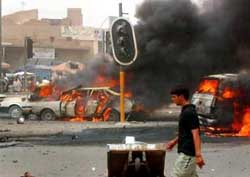 militants and detained 18 Monday during raids in central and northern Iraq militants and detained 18 Monday during raids in central and northern Iraq
A roadside bomb killed a soldier in the rural al-Qaida in Iraq stronghold of Arab Jabour on Saturday
U.S. warplanes bombarded
more than 30 targets in Arab Jabour during overnight airstrikes to clear the way for ground forces during the latest offensive
in the volatile area.
U.S.
military spokesman, said the military had al-Qaida on the run with recent operations. But he warned the group remains a force
in eastern Anbar, northeast of Baghdad in Diyala province, in areas surrounding the northern city of Kirkuk, "in small numbers
to the south of Baghdad" and in the northern city of Mosul.



New portrait of Iraq’s foreign fighters emerges
Cache of individual records leads U.S.
military to reassess assumptions
 By Karen DeYoung By Karen DeYoung
WASHINGTON - Muhammad Ayn-al-Nas, a 26-year-old Moroccan,
started his journey in Casablanca. After flying to Turkey
and then to Damascus, he reached his destination in a small
Iraqi border town on Jan. 31, 2007. He was an economics student back home, he told the al-Qaeda clerk who interviewed him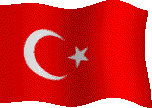 on arrival. Asked what sort of work he hoped to do in Iraq,
Nas replied: "Martyr." on arrival. Asked what sort of work he hoped to do in Iraq,
Nas replied: "Martyr."
Algerian Watsef Mussab, 29, who arrived
in Iraq via Saudi Arabia and Syria, said he had come for combat. He complained that the Syrian smugglers who brought him to
the border took his money, but he contributed wha t he had left to the insurgent cause -- a watch, a ring and an MP3 player. t he had left to the insurgent cause -- a watch, a ring and an MP3 player.
Their stories are among the individual records of 606 foreign
fighters who entered Iraq between August
2006 and August 2007. The cache of documents was discovered last fall by U.S.
forces in the northern Iraqi town of Sinjar. 
Analyzed
and made public last month by the Army's Combating Terrorism Center at West Point, the documents have led the U.S. military
in Iraq to reassess some of its earlier assumptions about the insurgent group and those who carry out most of the suicide
missions that are its signature method of  attack. attack.
Based on the Sinjar records, U.S. military
officials in Iraq said they now think that nine out of 10 suicide bombers have been foreigners, 90 percent of foreign fighters
entering Iraq during the one-year period ending in August came via Syria, more North Africans were foreign terrorists than
previously assessed," said Col. Steven A. Boylan

Saudi Arabia was by far the most common country of origin of foreign
fighters, with about 40 percent of the total, a surprising share -- 19 percent -- came from Libya. Overall, about 40 percent were North African
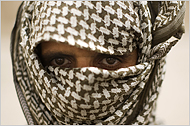

President Bush wanted Iraq
to be the center on the war on terrorism and his wish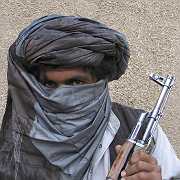 came true to a point (terror attacks around the world have increased also) came true to a point (terror attacks around the world have increased also)
So many
fanaticals travel thousands of miles and will endure anything to make it to Iraq
and kill Americans....become a "Martyr"...get their Virgins...

1 in 5 returning troops may have brain injury
Many do not know symptoms can be treated, 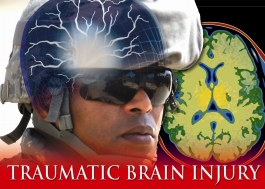 U.S. Army officials said U.S. Army officials said
WASHINGTON - As many as
20 percent of U.S. combat troops who fought in Iraq or Afghanistan leave with signs they may have had a concussion, and some
do not realize they need treatment, Army officials said Thursday.
Concussion
is a common term for mild traumatic brain injury, or TBI. While the Army has a handle on treating more sev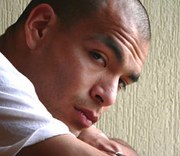 ere brain injuries, it is "challenged to understand, diagnose and treat military personnel who suffer with mild TBI," said
Brig. Gen. Donald Bradshaw ere brain injuries, it is "challenged to understand, diagnose and treat military personnel who suffer with mild TBI," said
Brig. Gen. Donald Bradshaw
It estimated that from
10 percent to 20 percent of soldiers and Marines from tactical units leaving Iraq
and Afghanistan are affected by mild traumatic
brain injury. The most common cause was blast from an explosion.


Iraq settles flag dispute
Iraq's parliament
has voted to adopt a new, temporary, national flag after the country's Kurdish minority said the Saddam Hussein-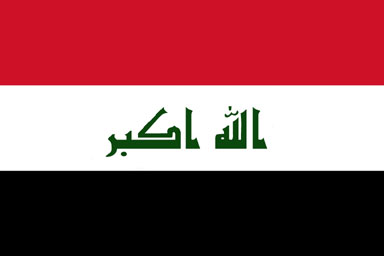 era banner is a reminder of his rule. era banner is a reminder of his rule.
In a rare act of unity, members of parliament
agreed on Tuesday on the emotive issue, representing a symbolic break with the past.
Without any serious opposition from Shia, Sunni Arab or Kurdish blocs, 110 out of 165 members supported the
new flag, which is still red, white and black.
However, three green stars in the centre,
 which represented Saddam's Baath party motto of unity, freedom and socialism, have been removed. which represented Saddam's Baath party motto of unity, freedom and socialism, have been removed.
The phrase Allahu Akbar (God is great) in green Arabic script remains on the new flag.

Four Iraqi tribal leaders killed
in bombing
Suicide
bomb attack kills members of Iraq’s ant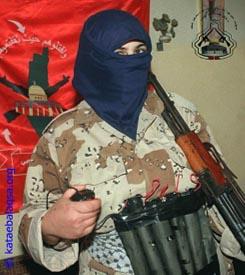 i-Qaeda ‘Diyala Awakening Council’. i-Qaeda ‘Diyala Awakening Council’.
BAQUBA
- A suicide bomber exploded his vest inside a house in central Iraq, killing four tribal leaders spearheading the fight against
Al-Qaeda in Diyala province, police and the US military said Saturday.
The attack
took place Friday evening in the home of Sheikh Taha al-Obeidi in the village of Dojemah, near the town of Khalis about 50
kilometres (30 miles) north of Baghdad, Khalis police official Lieutenant Colonel Mohammed al-Obeidi said.
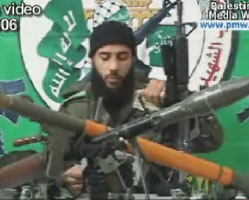
"Several
people were inside the house. The explosion killed four tribal leaders, all members of the Diyala Awakening Council," Obeidi
said.
"The chief
of the Awakening council in Khalis district, Sheik Fayez Lafta, was among those killed."
A US military
statement said Lafta and two other people had been killed in what it said was a bombing, but it gave few other details.
A doctor
at the hospital in Khalis said the facility had received the bodies of four people.
Awakening
Councils have sprung up across Iraq, structured on the lines of the Anbar 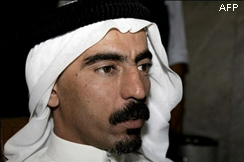 Awakening Council formed by Sunni tribal sheikhs in the western
in the western Iraqi province of Anbar to fight the Al-Qaeda
in Awakening Council formed by Sunni tribal sheikhs in the western
in the western Iraqi province of Anbar to fight the Al-Qaeda
in
Iraq group.
Al-Qaeda
has warned it will target leaders working alongside the US
military against insurgents, and claimed the September 13 car bomb killing of the leader of the Anbar Awakening Council, Abdul
Sattar Abu Reesha.

MRAP Sees First Iraq
Death
BAGHDAD - A Soldier killed over the weekend
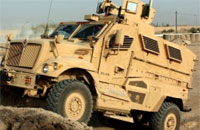 south of Baghdad was the first American casualty in a roadside
bomb attack on a newly introduced, heavily armored vehicle. south of Baghdad was the first American casualty in a roadside
bomb attack on a newly introduced, heavily armored vehicle.
The
V-shaped hull of the huge MRAP - Mine-Resistant, Ambush-Protected - truck is designed to deflect blasts from roadside bombs,
a weapon that has killed more American Soldiers than any other tactic used by Sunni insurgents and militia fighters in Iraq. other tactic used by Sunni insurgents and militia fighters in Iraq.
The Soldier who died Jan. 19 was the gunner who sits atop the MRAP vehicle. Three crew members tucked inside
the cabin were wounded. The vehicle rolled over after the blast and it was not clear how the gunner died - from wounds in
the explosion or in the subsequent roll-over.

66 killed
in southern Iraq clashes
US military forces surround battle area as Iraqi 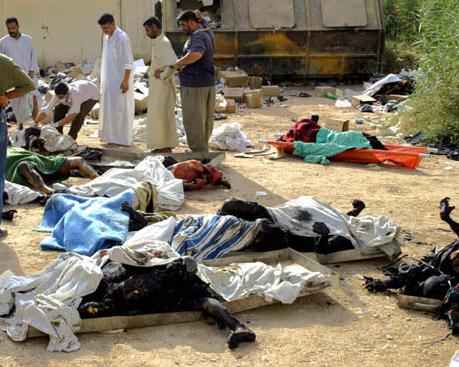 soldiers take on members of Shiite doomsday cult. soldiers take on members of Shiite doomsday cult.
NASIRIYAH, Iraq - Street battles between members of a shadowy messianic sect
and Iraq's security forces in two southern cities killed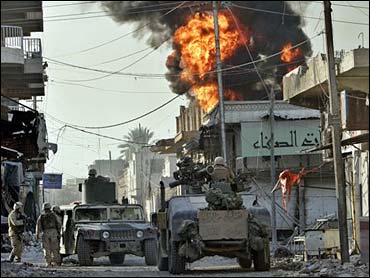 at least 66 people, mostly cultists. at least 66 people, mostly cultists.
At least 35 members of the Shiite doomsday cult
were killed in the southern port city of Basra and 18 in Nasiriyah, about 350 kilometres (220
miles) south of Baghdad.

Bomber kills Iraqi police chief touring blast site
Chief, 2 officers slain on wreckage of attack that killed 34 a day earlier
BAGHDAD - A suicide bomber killed an Iraqi 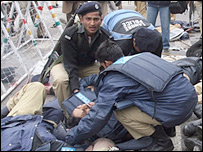 police chief and two other officers Thursday after they toured the site of the wreckage of a blast a day earlier that devastated
a predominantly Sunni neighborhood in the volatile northern city of Mosul. police chief and two other officers Thursday after they toured the site of the wreckage of a blast a day earlier that devastated
a predominantly Sunni neighborhood in the volatile northern city of Mosul.
The bomber on Thursday was wearing an explosives vest under an
Iraqi police uniform when he struck, killing Brig. Gen. Salah Mohammed al-Jubouri, the director of police for Ninevah province,
the U.S. military said. Two other policemen died and a U.S. soldier, three Iraqi police and an Iraqi soldier were wounded, the military
said.



24
JAN 08 McClatchy Newspapers
Baghdad
Two policemen were killed and 3 others wereinjured including a policeman
in an IED 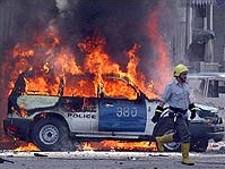 explosion in al Andulos square downtown Baghdad around 8,00 am explosion in al Andulos square downtown Baghdad around 8,00 am
A civilian was injured in an IED explosion in Zafaraniyah district southeast Baghdad around 4,30 am
Police
found three anonymous bodies in Baghdad today. Two bodies
were found in Doura neighborhood in Karkh, the western side of Baghdad while the third body
was found in Ma’amil neighborhood in Rusafa, the eastern side of Baghdad.
Mosul poli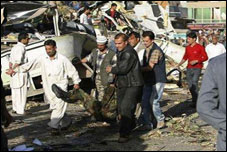 ce chief Brigadier General Salih Mohammed Hasan al Jobori and one of his guards were
killed and 10 other people including al Jobori guards were injured when a suicide bomber detonated himself among them while
al Jobori was visiting al Zinjili area west Mosul city where the explosion happened yesterday. Police said that the suicide
bomber was wearing a police uniform confirming that al Jobori was injured seriously and he died after moving him to the hos ce chief Brigadier General Salih Mohammed Hasan al Jobori and one of his guards were
killed and 10 other people including al Jobori guards were injured when a suicide bomber detonated himself among them while
al Jobori was visiting al Zinjili area west Mosul city where the explosion happened yesterday. Police said that the suicide
bomber was wearing a police uniform confirming that al Jobori was injured seriously and he died after moving him to the hos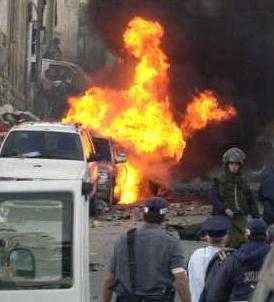 pital. pital.
Karbala
The spokesman of Karbala
health directorate Dr. Saleem Kadhim said that two of the guards of Sistani’s representative sheikh Abdul Mahdi al Karbala’i
were killed and two others were injured in an IED explosion that targeted his car only 500 meters away from the shrine of
Imam Hussein downtown Karbala city south of Baghdad at 9,00 pm. Abdul Mahdi’s received minor injuries and he left the
hospital after being treated, Kadhim said.
The toll of the explosion of Zinjili which took place yesterday rose to 40 killed people and 220 others
injured.



Iraqi Reinforcements Rush to Mosul
Al-Maliki announced reinforcements for Mosul two 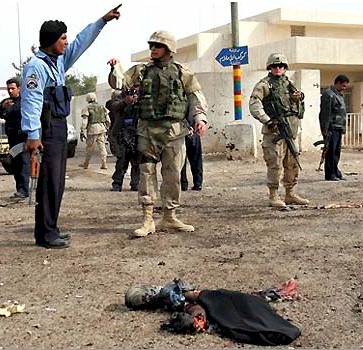 days after an abandoned apartment building, believed to be used as a bomb-making factory, was blown apart as the Iraqi army
was investigating tips about a weapons cache. days after an abandoned apartment building, believed to be used as a bomb-making factory, was blown apart as the Iraqi army
was investigating tips about a weapons cache.
At least 34 people were killed and 224 wounded when the blast tore through
surrounding houses in the Zanjili neighborhood, a poverty-ridden district on the west bank of the Tigris River.
A
suicide bomber then killed a police ch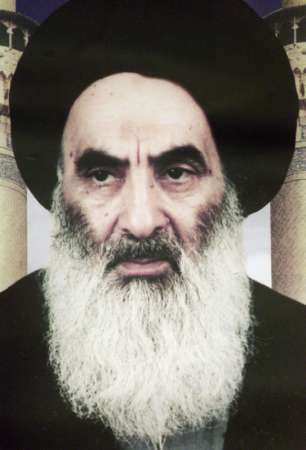 ief and two other officers Thursday as they toured the devastation. Residents taunted the chief and pelted him with
rocks moments before he was killed. ief and two other officers Thursday as they toured the devastation. Residents taunted the chief and pelted him with
rocks moments before he was killed.
There have been several assassination attempts against al-Sistani's followers in recent months as internal Shiite
rivalries increased in the oil-rich southern Iraq,
which also is home to some of the majority sect's most sacred shrines.



Round-up of Daily Violence
in Iraq
By Laith Hammoudi | McClatchy Newspapers
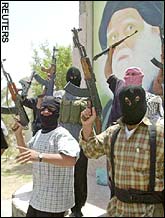 The daily Iraq
violence report is compiled by McClatchy Newspapers Special Correspondents in Baghdad
from police, military and medical reports. This is not a comprehensive list of all violence in Iraq, much of which goes unreported. It's posted without editing as transmitted
to McClatchy's Washington Bureau. The daily Iraq
violence report is compiled by McClatchy Newspapers Special Correspondents in Baghdad
from police, military and medical reports. This is not a comprehensive list of all violence in Iraq, much of which goes unreported. It's posted without editing as transmitted
to McClatchy's Washington Bureau.
Baghdad
Around 8 a.m. gunmen
used machine guns to attack policemen in Bab Al Sharqi, killing one policeman and injuring one.
A roadside
bomb targeted civilians in Al Qanat area causing no casualties.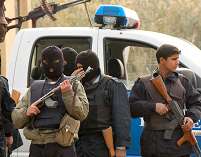
Around 10 a.m. a roadside
bomb targeted civilians near Al Shaab soccer stadium, injuring five civilians.
Diyala
- Iraqi police said the American and Iraqi troops clashed with gunmen
near Al Wajihiya area (about 25 Kilometers east of Baquba) killing four gunmen including a high ranking member of Al Qaeda.
-
Iraqi police found one body in Dora
A roadside bom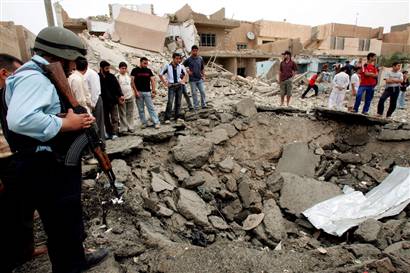 b targeted the personal car of one of Diyala governor's body guards in Abu Saida area. The guard was killed in the attack b targeted the personal car of one of Diyala governor's body guards in Abu Saida area. The guard was killed in the attack
Gunmen attacked a local council building in Baquba injuring two guards
A roadside bomb targeted police in Muqdadia, killing one police
officer and injuring 3 others
Mortar shells slammed
into Al Salam town about 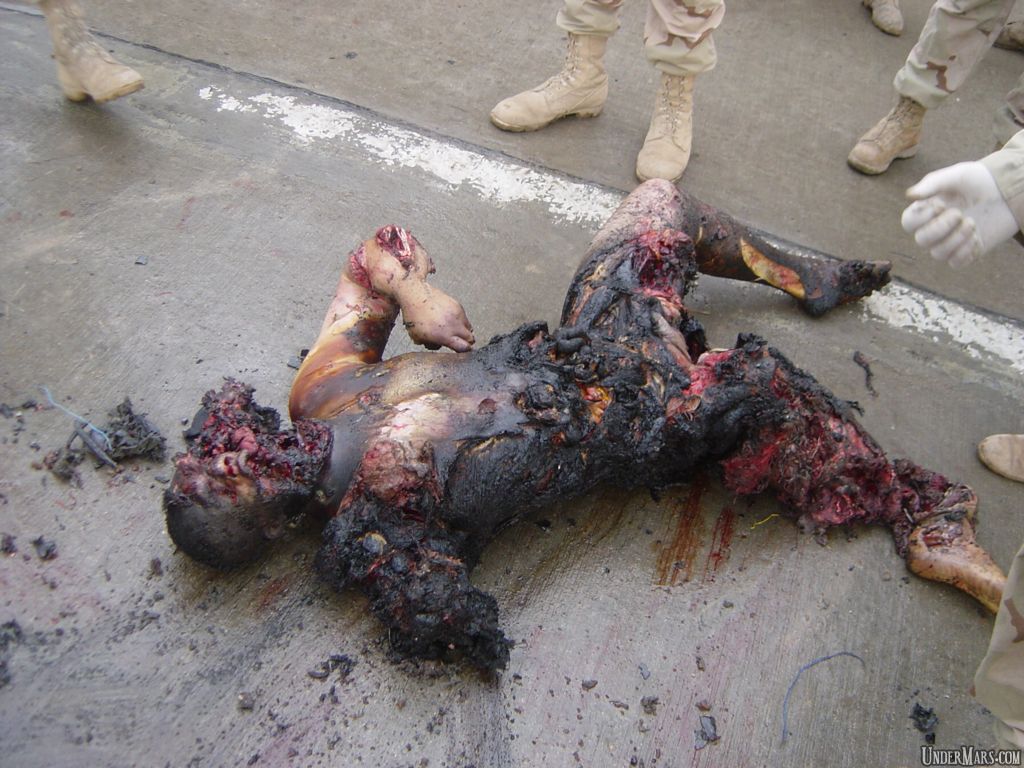 20 kilometers east of Baquba, injuring three residents. 20 kilometers east of Baquba, injuring three residents.
Sulaimaniyah
Police found two bodies in two
different areas of the province. The first deceased was Alaa Atiya, 27 years originally from Karbala,
with two gun shots in the head and the knee and was found west of Sulaimaniyah city yesterday. The second body belongs to
a Kurdish young man who was found in Sulaimaniyah city with gunshots in the body, police said.
2008 McClatchy Newspapers



Bush says US forces could stay for decade in Iraq
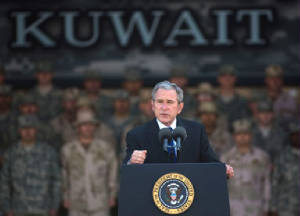
US president says on track for troop cut, warns Syria,
Iran to stop fuelling violence in Iraq.
CAMP ARIFJAN,
Kuwait - US President George W. Bush said his goal of reducing troop numbers
in Iraq by July was on track but called on Syria and Iran to stop fuelling violence in the war-torn country.
"I think the only thing I would say we are on track for... I will be on track to get down to
1 5" brigades from the current 20, Bush told reporters after talks with General David Petraeus, the commander of US forces in
Iraq, and US ambassador Ryan Crocker. 5" brigades from the current 20, Bush told reporters after talks with General David Petraeus, the commander of US forces in
Iraq, and US ambassador Ryan Crocker.
"The levels of violence are significantly reduced. Hope is returning to Baghdad and hope is returning to the towns and the villages throughout Iraq"
Syria "needs to further
reduce the flow of terrorists" going into Iraq, and "Iran must stop  supporting militias" that attack US forces and Iraqis, he added. supporting militias" that attack US forces and Iraqis, he added.
Bush's comments came only day after he conceded that US forces could stay
for a decade in Iraq, which is still gripped by bombings almost five years on from the US-led invasion despite last year's
troop "surge."
Asked in an interview with NBC television whether the US military presence might last 10 years, Bush said: "It could easily be that,
absolutely."

Bush calls for ‘an
ideology of hope'?
You are doing the hard work
necessary to pr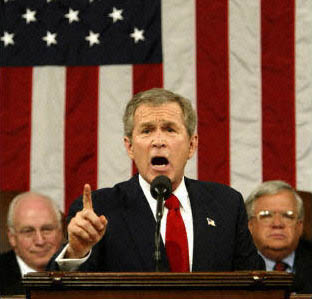 otect the United States of America because you have defeated an enemy overseas so we don't
have to meet them at home," Bush said. otect the United States of America because you have defeated an enemy overseas so we don't
have to meet them at home," Bush said.
He described the fight against terrorism as an "ideological struggle," adding:
"History will show that the best way to defeat the ideology of hate is with an ideology of hope."

Stand up for your
Country
It simply amazes me and I guess I am doomed 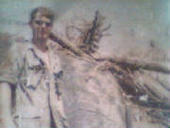 to never understand why after after learning the truthful facts of Bush’s rush to War with Iraq…ie Lies deceit…covering
up...money...power and more… the America people are not Outraged…like wise with his “I am the Decider”
and even if Lura and Barney (his dog) turn against him he will not bring our troops home till he decides… to never understand why after after learning the truthful facts of Bush’s rush to War with Iraq…ie Lies deceit…covering
up...money...power and more… the America people are not Outraged…like wise with his “I am the Decider”
and even if Lura and Barney (his dog) turn against him he will not bring our troops home till he decides…
We know he plays the 911 fear card
when 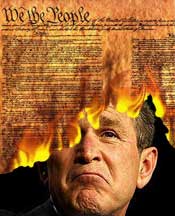 ever we get a little out of line…To this very day he still is lying…He has so many different phrases who can keep
up to him…He has ignored the rule of law after taking an oath to uphold it…He has threatened our world powers
with the“Your either with us or against us”… and all the illegal wire taps...Where is the outrage??? ever we get a little out of line…To this very day he still is lying…He has so many different phrases who can keep
up to him…He has ignored the rule of law after taking an oath to uphold it…He has threatened our world powers
with the“Your either with us or against us”… and all the illegal wire taps...Where is the outrage???
The “Surge” is working for the military boots
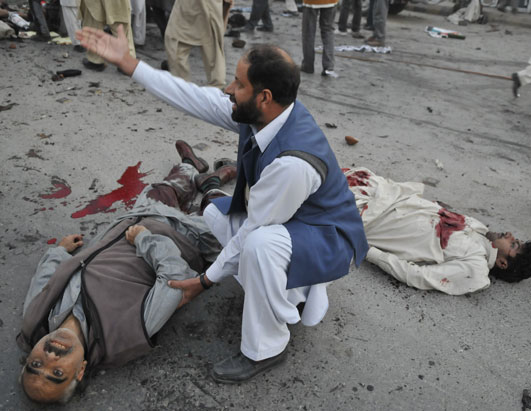 on the ground but the violence is still there it’s just heading in a different direction…Shiite on Shiite…tribal
leaders throwing their soldiers in with ours and Iraq to defeat the terrorist(which they are???)…The last three days
of headlines on this page tells me there is plenty of violence going on in Iraq… on the ground but the violence is still there it’s just heading in a different direction…Shiite on Shiite…tribal
leaders throwing their soldiers in with ours and Iraq to defeat the terrorist(which they are???)…The last three days
of headlines on this page tells me there is plenty of violence going on in Iraq…
The tough talk of Bush to Iran and Syria continue on a dangerous level…what would it 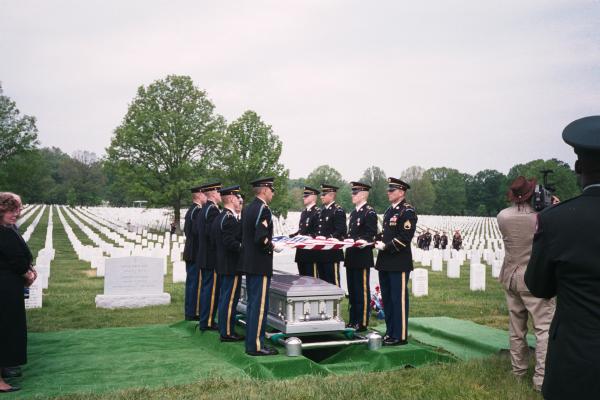 take for them to get fully involved in Bush’s madness…??? The fighting has already spilled into Turkey and Pakistan…two of our closest
allies…how many more insurgents of other countries will come to Iraq
to kill “Americans”… I don’t have the answers but I do know that this game that Bush is playing has
cost our greatest resource…The American Soldier... take for them to get fully involved in Bush’s madness…??? The fighting has already spilled into Turkey and Pakistan…two of our closest
allies…how many more insurgents of other countries will come to Iraq
to kill “Americans”… I don’t have the answers but I do know that this game that Bush is playing has
cost our greatest resource…The American Soldier...
Stand up for this great Nation...it take a few minutes to e-mail a Congressman...the  White House...The Senate...There are litterlly thousands of ways you can help restore the greatness and pride we once had...The
world is ran by those who show up...make a difference and get involved...after all it's your country... White House...The Senate...There are litterlly thousands of ways you can help restore the greatness and pride we once had...The
world is ran by those who show up...make a difference and get involved...after all it's your country...
Are you happy with it's state of affairs...???

|
| CLICK |




IRAQ
There
have been 4,237 coalition deaths -- 3,931 Americans, two Australians, 174 Britons, 13 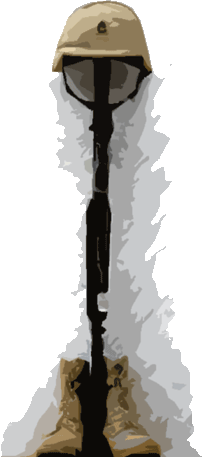 Bulgarians, one Czech, seven Danes, two Dutch, two Estonians, one Fijian, one Hungarian, 33 Italians, one Kazakh, one Korean,
three Latvian, 22 Poles, three Romanians, five Salvadoran, four Slovaks, 11 Spaniards, two Thai and 18 Ukrainians -- in the
war in Iraq as of January 25, 2008 Bulgarians, one Czech, seven Danes, two Dutch, two Estonians, one Fijian, one Hungarian, 33 Italians, one Kazakh, one Korean,
three Latvian, 22 Poles, three Romanians, five Salvadoran, four Slovaks, 11 Spaniards, two Thai and 18 Ukrainians -- in the
war in Iraq as of January 25, 2008
AFGHANISTAN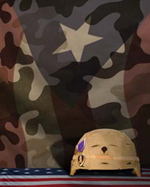
There have been 750 coalition
deaths -- 475 Americans, four Australians, 87 Britons, 78 Canadians, one Czech, nine Danes, 12 Dutch, two Estonians, one Finn,
12 French, 22 Germans, 10 Italians, three Norwegians, one Pole, two Portuguese, five Romanians, one South Korean, 23 Spaniards,
two Swedes -- in the war on terror as of January 25, 2008.






Links To help Our Troops and Our Nation…Get Involved...It’s Your Country...America...Wake
up...




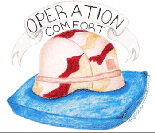








Cost of the War
in Iraq (JavaScript Error)
|

